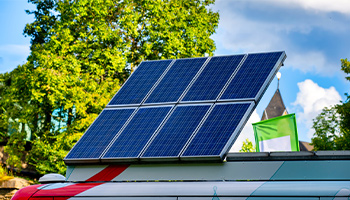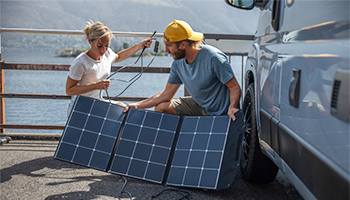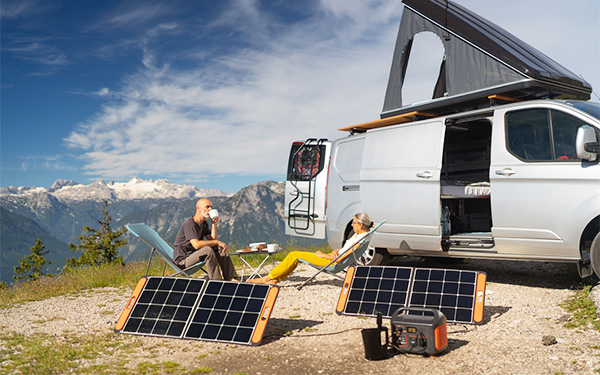Due to their ease of portability and environmental benefits, solar panels have become a popular upgrade amongst RVers. With RV solar panels, you can venture further off-grid and eliminate the process of searching for an available hookup in a crowded campsite. Plus, they also help reduce your RV’s overall carbon footprint.
If you’ve been thinking about purchasing solar panels for your RV, this guide will walk you through everything you should know before purchasing.
How Do RV Solar Panels Work?

RV solar panels convert sunlight into usable electricity. When sunlight hits a solar panel, it creates an electrical current that feeds into a charge controller. This device controls the amount of current flowing into the battery.
As the battery charges, it produces DC (direct current) power, which can run your RV’s interior lights, slide-outs, and radio. To power plug-in electronics, such as a microwave, an inverter is used to convert the DC power into AC power (plug-in).
Because of their design and efficiency, solar panels offer RVers loads of benefits:
- Cost-effective: once solar panels are set up, they’re an easy, cost-effective way of generating electricity for your RV without a generator.
- (Almost) maintenance-free: solar panels have no moving parts and require little to no maintenance besides regular cleaning.
- Camp anywhere: solar panels are perfect for those that enjoy boondocking and camping off-grid.
How Many Solar Panels Do I Need?
Before purchasing a solar system, it’s essential to understand your RV’s typical energy consumption. To figure out how many solar panels your RV will require, you’ll need two key figures:
- Your daily watt-hours usage (usage)
- The amount of storable energy your solar panels can provide to your RV batteries (storage)
For the best results, these two figures should balance each other out. You won’t have access to the power you need if you have too many panels and not enough batteries. Conversely, if you have too many batteries and not enough panels, your system won’t be able to generate enough power to charge your batteries.
Calculating Daily Watt-Hours (Usage)
You can calculate your daily power consumption in two ways: manually calculating the total sum or using a battery monitor.
To calculate your total usage manually, set aside the electronics you wish to use onboard and estimate how long you’ll use them in hours.

For example, let’s say you have a microwave that uses 600 Watts and estimate that you’ll use it for about 20 minutes per day while camping. By multiplying 600W by 0.33 hours (20/60), we get 200 Watt-hours (Wh). Do this for all your electronics; your total will determine the number of Watt-hours you use per day.
Purchasing a battery monitor is an easier option if you’re not a fan of math. For this method, simply head out and camp off-grid while using the monitor to track your battery usage throughout the day. By the end of the day, you should have an accurate reading of how much power you use.
How Much Energy Do Solar Panels Provide? (Storage)
Generally, a typical 100-Watt solar panel will produce around 400-600 Watt-hours per day, depending on weather conditions and time of year. When selecting your system, ensure it will provide the Watt-hours you need. Your RV should also have enough batteries to store that amount of power. Typically, RV batteries have a storage capacity of about 1200 Watt-hours.
For a balanced system, your RV’s production/storage capacity should equal your energy needs.
The Different Types of RV Solar Panels
When it comes to RV solar panels, there are three different types of panels available.
- Monocrystalline panels: the most efficient panels available but also the most expensive.
- Poly-crystalline panels: these panels tend to be your cost-effective option as they are cheaper than monocrystalline panels but are slightly less efficient.
- Amorphous panels: these panels are new to the market and are significantly less efficient than their counterparts. However, these panels are thin and bendable, making them easy to install.
What About Portable Panels?

A portable solar panel system may better suit your needs if you tend to take shorter weekend trips, or don’t need much additional power. Unlike traditional mounted systems, portable panels can be easily set up and deconstructed whenever needed. However, if purchasing a portable system, keep in mind that it’ll typically cost you a bit more to obtain a power output similar to a mounted system.
How Much Do Solar Panels Cost, and Are They Worth It?
The overall amount you spend on your solar panel system will ultimately depend on various factors, such as your energy requirements, the types of panels you choose, and whether or not you’ll need to purchase additional batteries.
It’s possible to find beginner portable kits starting at around $200. For mounted systems, expect to pay about $600 to $1,000 for a simple system and up to $2,000 or more for a more complex, heavy-duty system.
Despite their benefits, an RV solar panel system may not be worth it for every RVer. If you routinely visit campsites or RV parks that already include hookup costs in their rates, investing in solar panels may not be the best decision. If you frequently boondock, however, solar panels can be a worthy replacement for a bulky generator.
Keeping Your RV Protected
No matter what kind of RV you own, it’s essential to keep it protected with a specialized RV policy.
Unlike a typical auto policy, a specialized RV policy offers additional protection that will keep your rig safe in the event of an accident. With coverage types such as Personal Effects Coverage, you can ensure your personal items are covered while you’re out on your adventure.
To learn more about the available coverage options for your RV and solar panels, give one of our RV insurance specialists a call at (866) 501-7335.
The information in this article is obtained from various sources and is offered for educational purposes. Furthermore, it should not replace manuals or instructions provided by the manufacturer or the advice of a qualified professional. No warranty or appropriateness for a specific purpose is expressed or implied.
